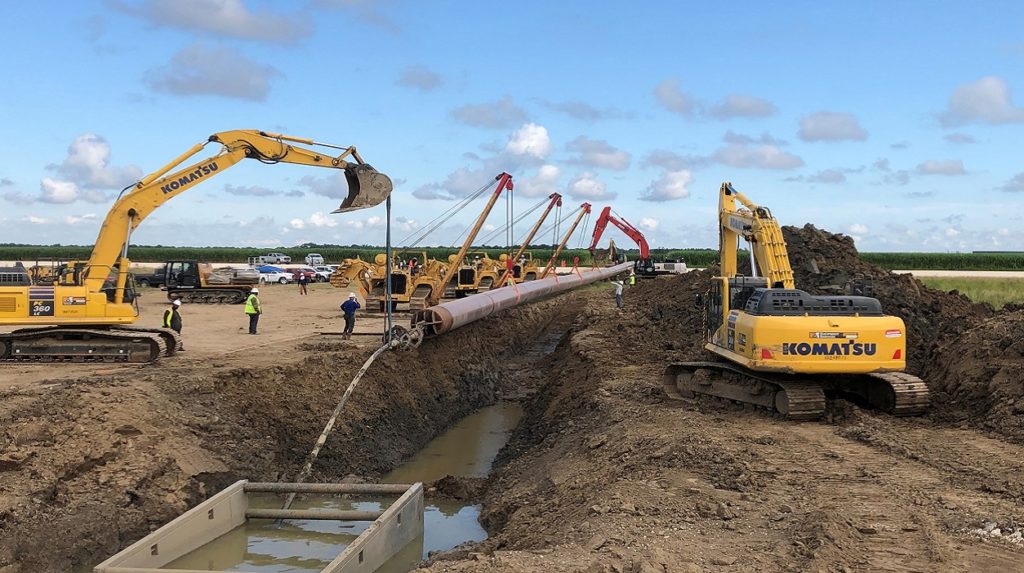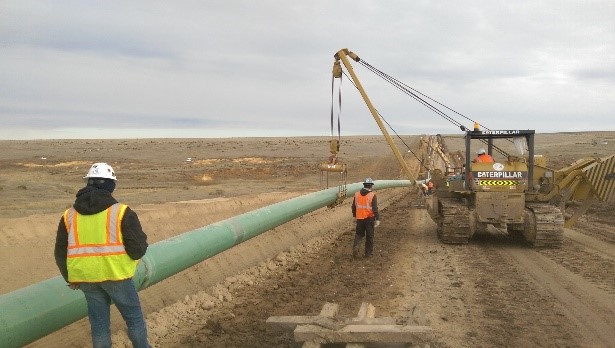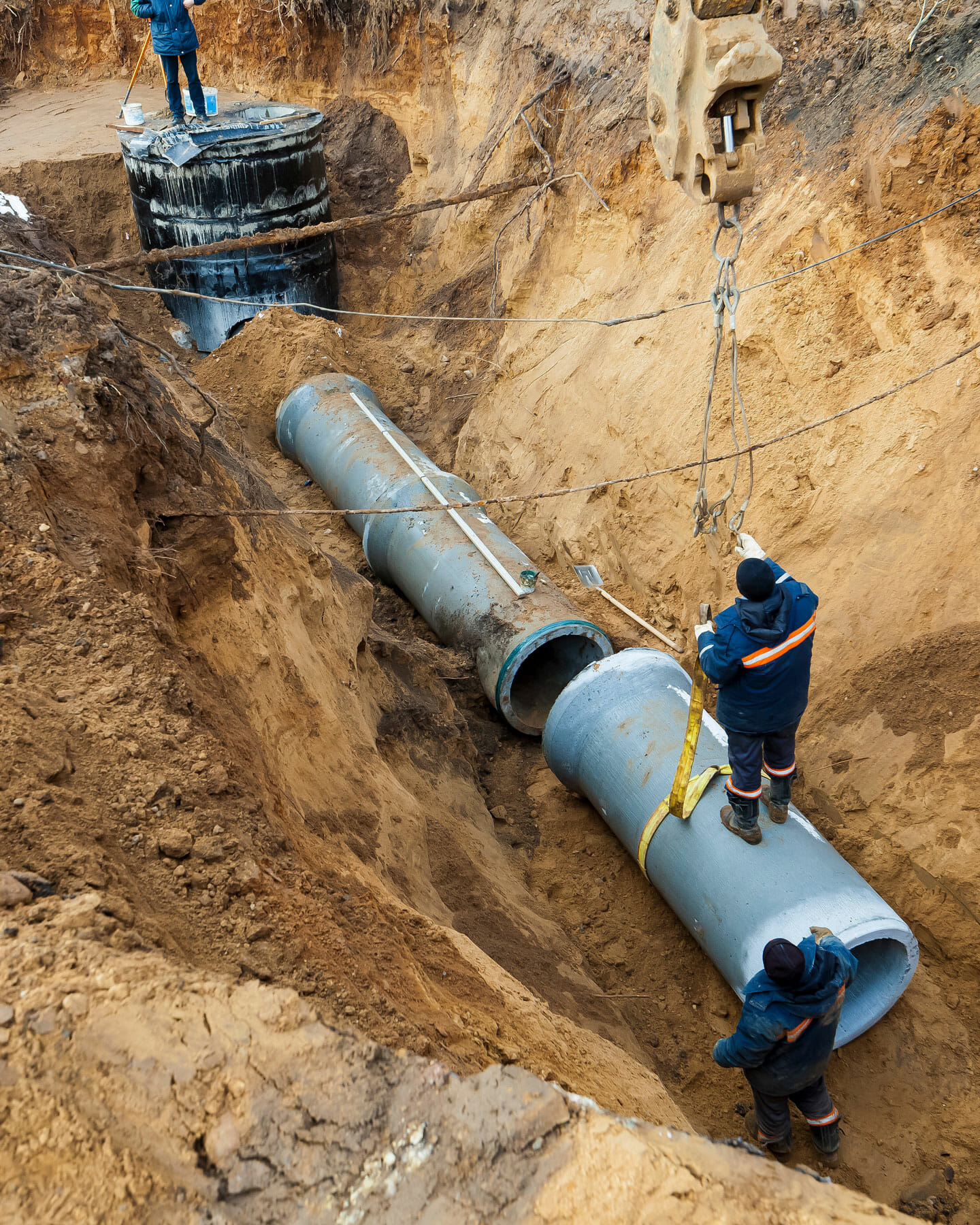How Pipeline Construction Excellence Promotes Sustainability
Why Pipeline Construction Is Necessary for Energy Infrastructure Growth
Pipeline construction plays a crucial function in the growth of energy framework, offering as the foundation for the transport of crucial resources like oil and all-natural gas. This detailed network not just promotes efficient circulation yet likewise bolsters economic development via task creation and neighborhood financial investment. Furthermore, improvements in safety technologies are resolving ecological concerns, positioning pipelines as a keystone of lasting power approaches. The complexities bordering pipeline projects raise vital inquiries about regulative structures and their long-lasting influence on communities and ecosystems. Checking out these dimensions exposes a diverse narrative that calls for cautious factor to consider.
Function of Pipelines in Energy Supply
The critical duty of pipelines in power supply can not be overemphasized, as they act as the foundation of modern power facilities. Pipelines are important for the reliable transportation of various forms of power, including oil, gas, and refined items. They promote the activity of these sources from extraction sites to refineries and warehouse, making sure that power gets to customers in a timely manner.The construction of pipelines entails careful preparation and adherence to governing standards, reflecting the intricacies of the energy market and environmental factors to consider. Effective pipeline networks are designed to reduce transportation times, reduce prices, and improve safety and security, while likewise resolving possible environmental impacts. The capacity to deliver big volumes of power over cross countries makes pipelines a recommended selection for power companies wanting to maximize their supply chains.Moreover, pipelines contribute to energy protection by expanding supply routes and resources. As worldwide power needs rise and fall, pipelines make it possible for regions to access numerous power products, mitigating threats connected with dependence on single resources. This diversity cultivates competitive pricing and stabilizes markets, which is important in an increasingly interconnected worldwide economy.In addition to their logistical benefits, pipelines support local economies by creating tasks during construction and upkeep stages. The existence of a durable pipeline infrastructure likewise brings in investments in energy tasks, additionally improving regional development. Inevitably, pipelines are vital to the energy field, providing a trustworthy and reliable ways of transportation that underpins financial growth and sustainability.

Advantages of Reliable Transportation
Reliable transportation through pipeline systems offers substantial benefits, consisting of minimized transportation costs and enhanced delivery speed. These benefits not only boost the general economics of power circulation but likewise play an important role in decreasing the ecological impact linked with energy transportation. As power demands continue to increase, the relevance of enhancing transportation approaches ends up being significantly noticeable.

Reduced Transport Costs
Lowered transport expenses stand for a notable advantage in the domain of energy facilities development. The construction of pipelines gives a much more economically viable means of transporting energy resources contrasted to alternate methods such as trucking or rail transportation. Pipelines, as soon as established, permit the constant flow of oil, gas, and other items over cross countries with very little functional costs.One of the key factors for lowered transportation expenditures is the performance of pipeline systems. They can transfer big quantities of materials concurrently, therefore spreading out repaired expenses over a higher amount of product. This mass transport capability significantly reduces the price each, making energy resources much more cost effective for customers and businesses alike.Additionally, pipelines minimize the dangers and expenses connected with handling and storing unpredictable materials. Unlike rail or road transportation, which can incur delays and damage, pipelines give a much safer and a lot more regular approach of power transportation. This integrity boosts the economic expediency of energy jobs, permitting for far better pricing frameworks in affordable markets. Ultimately, decreased transport costs cultivate an even more lasting power sector, advertising bigger access and motivating investment in further growth.
Improved Delivery Speed
Pipelines substantially enhance shipment rate in energy transportation, using a vital advantage over traditional techniques such as trucking or rail systems. The continuous circulation of products with pipelines permits for a constant and reliable transport process, lessening hold-ups linked with loading and dumping. This consistent activity is particularly important for power resources, where need can rise and fall rapidly.Moreover, pipelines can operate around the clock, unaffected by web traffic problems or weather-related disruptions that can impede road or rail transportation. This integrity assures that energy items reach consumers swiftly, sustaining functional demands and boosting financial security. Additionally, the scalability of pipe systems facilitates the handling of large quantities of power, which is crucial for fulfilling the expanding demands of sectors and property sectors.Furthermore, the integration of innovative tracking and control innovations in pipe systems enhances the delivery procedure. These developments enable for real-time tracking of circulation rates and system stress, ensuring that any potential concerns are attended to without delay. Generally, the boosted shipment speed provided by pipelines is a considerable consider enhancing power facilities and assuring that supply chains continue to be durable and receptive to market demands.
Ecological Effect Considerations
The advantages of quick energy transportation extend past logistical advantages; they likewise include significant ecological factors to consider. Reliable pipe systems enable for the transport of power sources with minimal disturbance to environments contrasted to alternative methods such as truck or rail transportation. Pipelines can help with the movement of oil, gas, and other products in an extremely concentrated way, which decreases the carbon impact connected with power distribution.Moreover, pipelines are created with sophisticated safety and security and tracking modern technologies that significantly reduced the threat of spills and leaks. A reliable pipeline infrastructure lessens the need for frequent transport activities, which can result in lowered greenhouse gas exhausts with time (Midland Pipeline Construction Authority). The capability to move energy sources straight to consumers reduces reliance on even more polluting transportation methods, even more profiting air quality.In enhancement, calculated pipe placement can aid maintain sensitive environments by following existing hallways, therefore reducing the impact on wild animals and all-natural landscapes. On the whole, the construction of pipelines not just supports energy infrastructure advancement however additionally supplies an environmentally liable ways of transferring power, adding to an extra sustainable future
Economic Effect of Pipeline Projects
The financial impact of pipe tasks prolongs past plain transport effectiveness, considerably affecting local and regional economic situations. These efforts create task possibilities during both construction and ongoing procedures, promoting community development (Pipeline Construction Authority). Furthermore, the stimulation of economic growth via boosted financial investment and infrastructure enhancement is an essential benefit of pipeline construction
Task Creation Opportunities
While energy framework projects usually encounter scrutiny, they provide considerable work development opportunities that can favorably influence neighborhood economic climates. Pipeline construction tasks require a varied variety of proficient labor, consisting of engineers, job supervisors, and specialized professionals, as well as unskilled laborers for numerous duties. This multifaceted need for labor can result in the development of thousands of tasks during the construction stage and typically causes lasting employment opportunities once the framework is operational.In enhancement to direct employment, pipeline jobs stimulate neighborhood economic climates by generating secondary work opportunities in sectors such as transportation, manufacturing, and hospitality. Local companies take advantage of boosted demand for products and services, adding to overall economic health and wellness. Furthermore, the influx of workers can result in boosted tax obligation profits for city governments, which can be reinvested in area solutions and infrastructure.Moreover, pipe construction projects commonly focus on employing regional workers, promoting a sense of neighborhood investment and support. By connecting the space between energy supply and need, these tasks not just enhance power security yet also work as catalysts for economic growth, reinforcing the importance of pipeline construction in job development other initiatives.
Financial Development Stimulus
Pipeline tasks offer as an effective economic development stimulation, driving substantial financial investments into local and local economic situations. The construction and operation of pipelines create a surge result, creating need for products, devices, and services (Professional Oilfield Services Texas). This increase of funding sustains regional businesses, from making to hospitality, cultivating a durable economic environment.Moreover, these jobs create considerable tax obligation profits for towns and states, which can be reinvested in civil services, framework enhancements, and community growth efforts. The financial benefits prolong past immediate work production, as skilled labor is commonly needed for recurring upkeep and procedures, making sure long-term employment opportunities.Additionally, the enhanced energy framework helps with the effective transportation of sources, possibly lowering power expenses for consumers and businesses alike. By enhancing power ease of access, pipelines can draw in brand-new sectors and stimulate growth in existing fields, adding to total financial diversity
Ecological Factors To Consider and Developments
Balancing energy requires with environmental integrity comes to be significantly important as pipe construction expands. The quest of reliable energy transportation need to represent ecological influences, necessitating cutting-edge techniques and innovations that lessen environmental disturbance. Modern pipeline projects are significantly incorporating advanced ecological evaluations at every stage, making certain that prospective risks are identified and reduced early in the preparation process.One remarkable innovation in this area is the fostering of trenchless innovation, which enables for the installment of pipelines without considerable surface area interruption. This approach minimizes environment fragmentation, preserves existing ecosystems, and decreases the carbon footprint connected with typical excavation methods. In addition, real-time tracking systems geared up with sensors allow operators to spot leakages or environmental changes promptly, thus facilitating prompt responses to prospective hazards.Moreover, the incorporation of ecologically friendly products and construction strategies is gaining grip. Biodegradable boring liquids and corrosion-resistant finishes can considerably decrease the ecological footprint of pipe projects. Firms are likewise committing to bring back environments post-construction, utilizing indigenous plant species to assist in environment recovery.Collaboration with ecological firms and local neighborhoods is essential - Pipeline Construction Authority. Involving stakeholders in the decision-making process cultivates transparency and advertises sustainable methods, ensuring that energy infrastructure advancement lines up with environmental stewardship
Obstacles in Pipeline Construction
Amid the growing need for power framework, numerous challenges make complex the construction of pipelines. Among the key problems is the geographical variability of pipeline courses, which can pass through varied landscapes, including mountains, rivers, and urban locations. Each setup calls for customized design solutions to deal with environmental management, geological security, and logistical constraints.Additionally, the general public perception of pipe projects usually presents a considerable obstacle. Regional communities may reveal worries relating to possible ecological effects, security risks, and interruption throughout construction. This resistance can result in delays, enhanced costs, and the necessity for comprehensive community engagement methods to foster acceptance.Moreover, labor scarcities in competent professions better make complex pipe construction initiatives. As the need for power framework expands, the accessibility of skilled employees diminishes, which can result in job delays and enhanced labor prices. The pipe sector have to purchase workforce growth efforts to grow a knowledgeable labor pool capable of fulfilling the evolving demands.Safety stays a critical issue throughout the construction process. The industry encounters the obstacle of ensuring that all security methods are complied with, as even minor gaps can result in substantial crashes. This requires rigorous training and oversight to keep operational integrity.Lastly, fluctuating product prices can impact job spending plans and timelines. The demand for top quality materials, coupled with market volatility, needs careful monetary planning and threat reduction strategies to maintain projects on the right track. Dealing with these difficulties is essential for the successful and effective construction of pipelines as component of a durable energy infrastructure.
Regulative Framework and Compliance
The regulative structure governing pipeline construction is intricate and multifaceted, calling for compliance with a range of government, state, and neighborhood regulations. At the federal degree, firms such as the Federal Energy Regulatory Payment (FERC) and the Pipeline and Hazardous Materials Security Management (PHMSA) play essential functions in looking after pipeline tasks. FERC controls the transport of gas and oil, approving projects based upon economic demand and public rate of interest, while PHMSA focuses on safety standards and the integrity of pipe operations.State laws can vary considerably, with specific states imposing their own allowing procedures, safety and security regulations, and environmental assessments. State public utility payments may need added analysis of recommended paths to guarantee marginal disruption to communities and environments. Compliance with the National Environmental Plan Act (NEPA) is likewise essential, mandating comprehensive ecological influence analyses prior to job approval.Local regulations might better make complex the compliance landscape, as towns typically have certain zoning regulations, land usage policies, and community interaction needs. Involving with regional stakeholders is not only a governing need but likewise a finest method to facilitate smoother project execution.Moreover, the regulative landscape is continuously evolving, influenced by public view, technological developments, and environmental policies, demanding consistent watchfulness from pipeline drivers. Steering with this detailed regulatory framework is vital for verifying that pipeline construction jobs are not only legitimately certified yet additionally socially accountable and ecologically lasting, therefore adding to the overall efficiency of energy facilities growth.
Future Fads in Pipeline Facilities
A significant transformation is underway in pipeline framework, driven by advancements in technology, Visit Your URL progressing power demands, and enhancing ecological awareness. As the global energy landscape changes in the direction of eco-friendly sources, pipe systems are adjusting to suit varied energy types, consisting of natural gas and biofuels, while additionally integrating more advanced surveillance and safety and security technologies.One remarkable fad is the consolidation of electronic options, such as Internet of Things (IoT) devices and artificial knowledge (AI), which enhance real-time surveillance and predictive maintenance capabilities. These advancements not only enhance operational performance however likewise noticeably reduce the risk of leaks and mishaps, making sure better environmental management. Furthermore, using sophisticated materials, such as composite pipes, is getting grip because of their durability and resistance to corrosion, further prolonging the life-span of pipe systems.Moreover, the focus on sustainability is triggering the advancement of greener construction techniques. Methods such as trenchless technology lessen land disruption and ecological impact, lining up pipe jobs with modern-day ecological criteria. On top of that, governing structures are evolving to promote transparency and liability in pipe procedures, ensuring stakeholders are more educated about potential threats and benefits.
Often Asked Inquiries
Exactly How Do Pipelines Contrast to Other Transportation Approaches for Power Resources?
Pipelines provide an economical, efficient, and eco-friendly approach for moving energy sources compared my latest blog post to choices like vehicles and trains, which typically sustain greater functional costs, better land usage, and raised greenhouse gas discharges. - Pipeline Construction Excellence

What Materials Are Commonly Made Use Of in Pipeline Construction?
Typical products utilized in pipe construction include carbon steel, stainless-steel, and plastic composites. These materials are chosen for their stamina, longevity, rust resistance, and suitability for numerous environmental problems and types of carried power resources.

The length of time Does It Usually Require To Construct a Pipeline?
The duration for pipeline construction differs significantly based on factors such as length, terrain, and regulative needs. Commonly, it can range from several months to a couple of years, depending upon project complexity and ecological considerations.
Who Are the Secret Stakeholders in Pipeline Projects?
Trick stakeholders in pipe tasks consist of federal government firms, regulative bodies, energy business, environmental companies, regional areas, and landowners - Midland Pipeline Construction Authority. Each group plays an important role in planning, permitting, construction, and continuous procedures of pipe framework
What Are the Key Safety Procedures During Pipeline Construction?
During pipe construction, key security procedures include strenuous site analyses, adherence to regulatory standards, detailed training for workers, making use of individual protective devices, and continuous monitoring of environmental conditions to alleviate risks and assure operational safety.